仁爱版八年级英语下册课件 3AUnit 5 Topic 2 I’m feeling better now (共85张PPT)
文档属性
| 名称 | 仁爱版八年级英语下册课件 3AUnit 5 Topic 2 I’m feeling better now (共85张PPT) |  | |
| 格式 | zip | ||
| 文件大小 | 4.2MB | ||
| 资源类型 | 教案 | ||
| 版本资源 | 科普版 | ||
| 科目 | 英语 | ||
| 更新时间 | 2017-04-01 17:03:37 | ||
图片预览

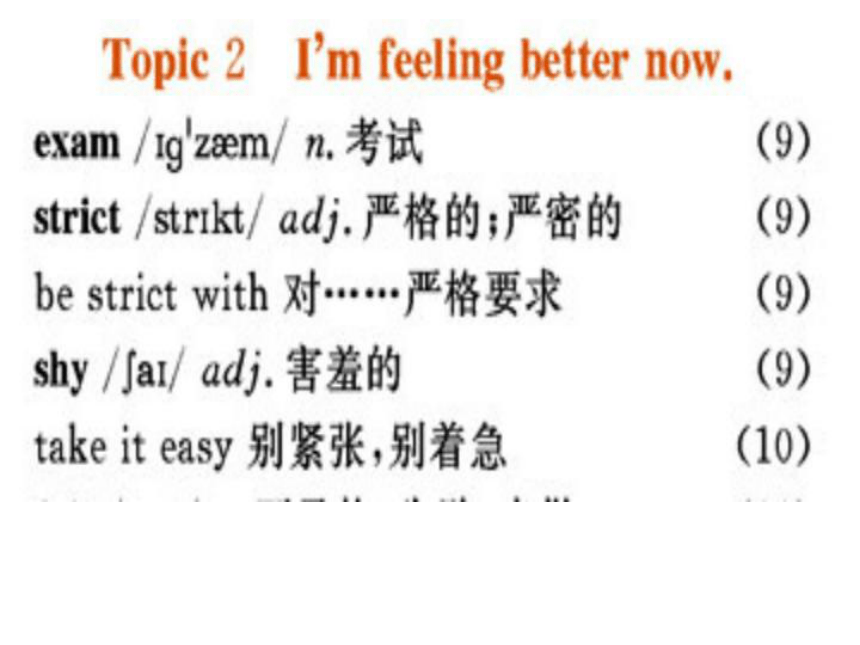
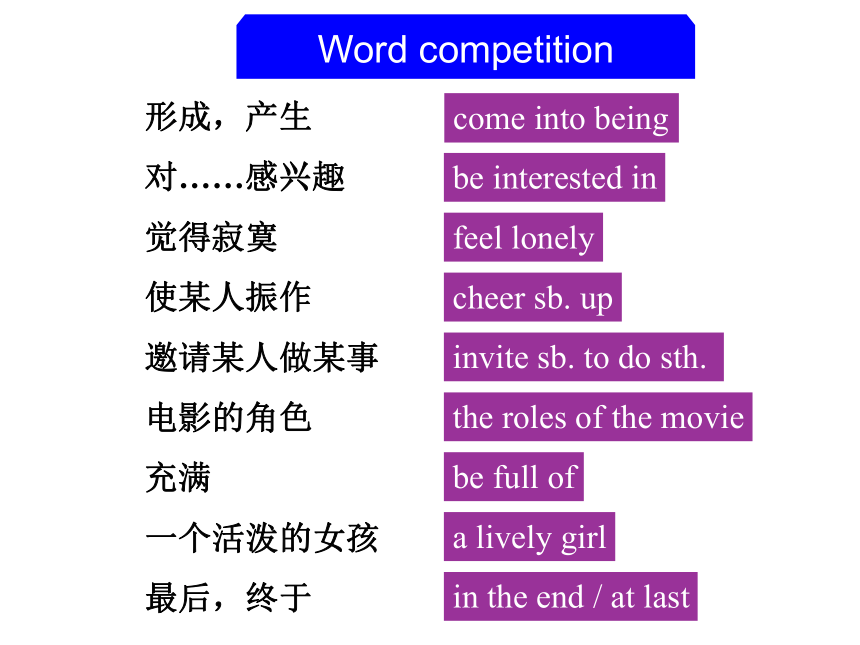
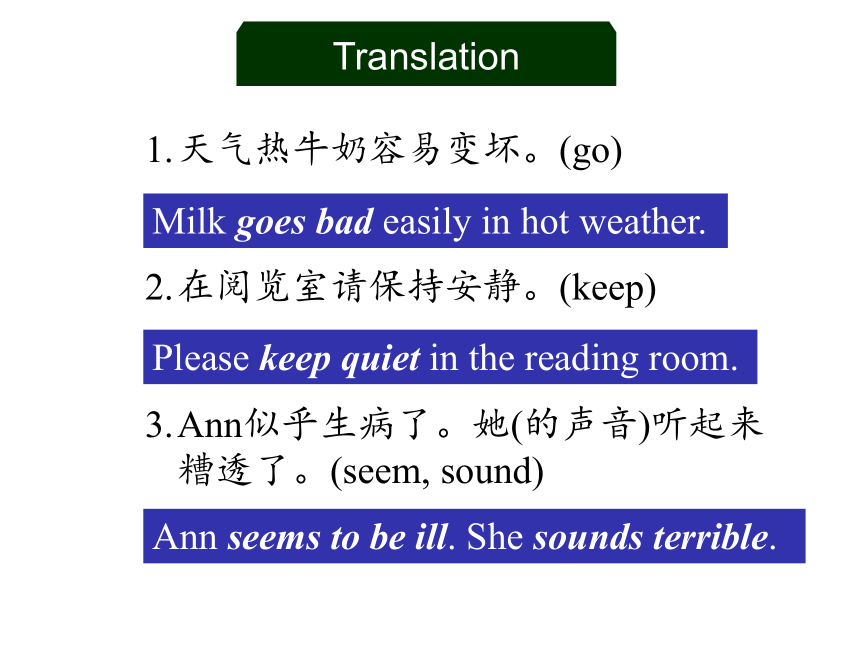
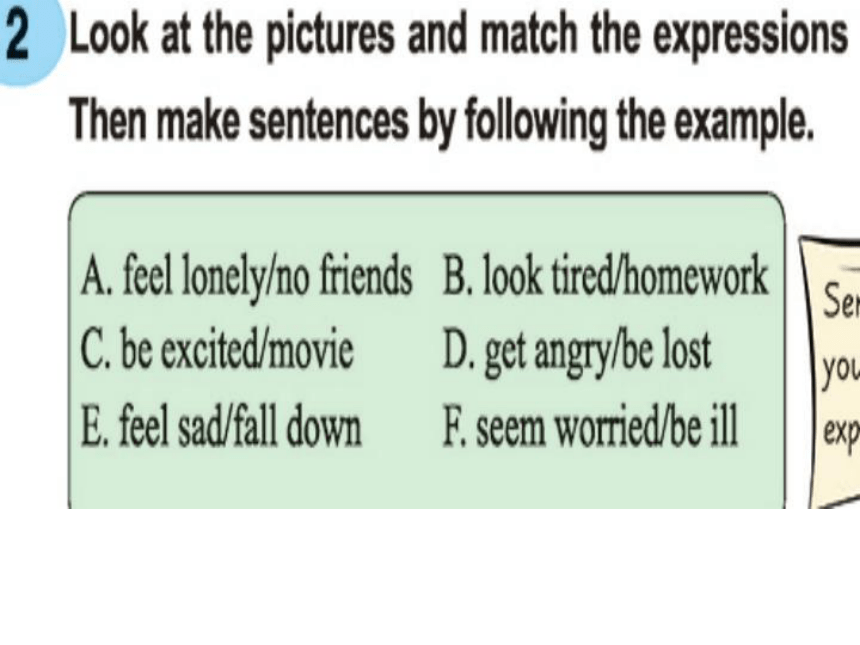

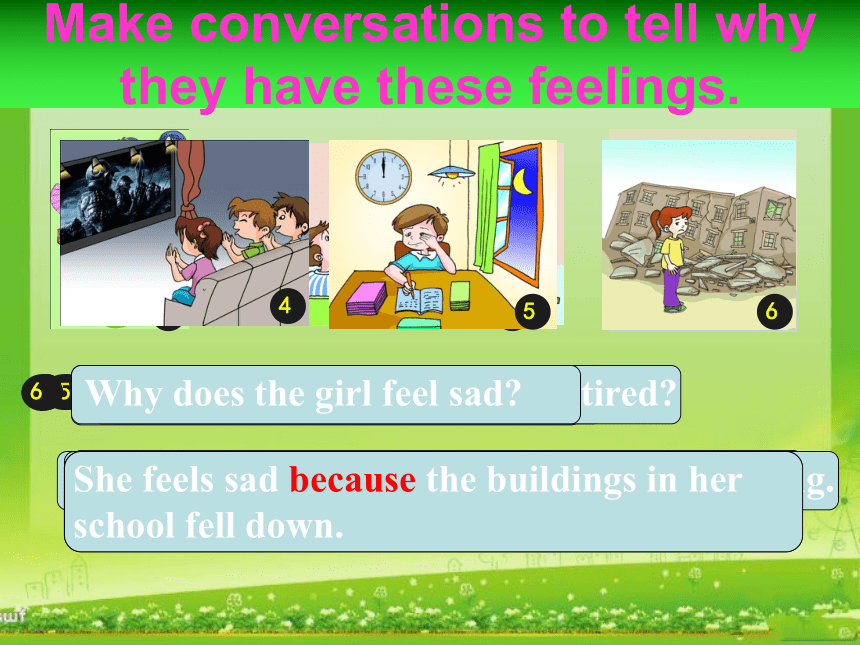

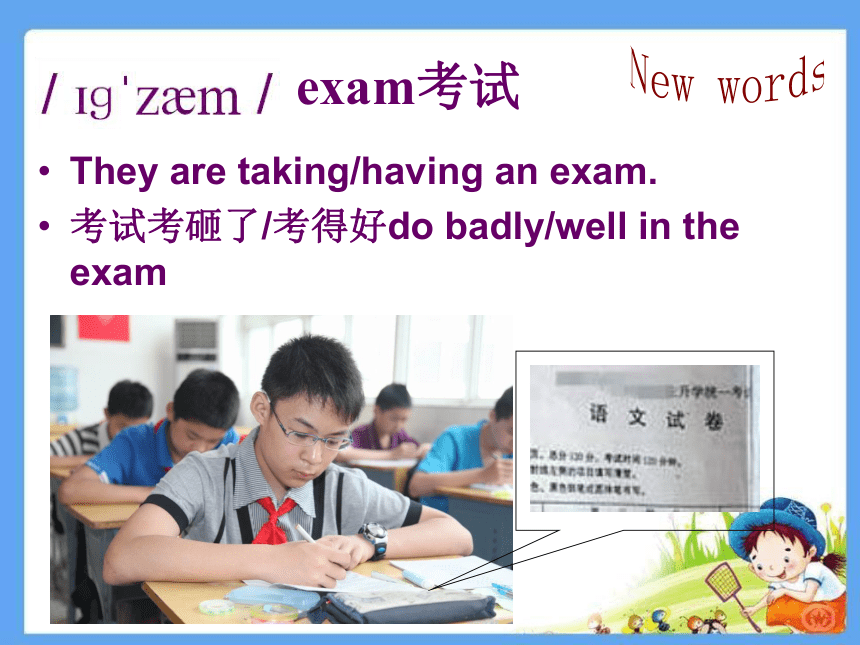

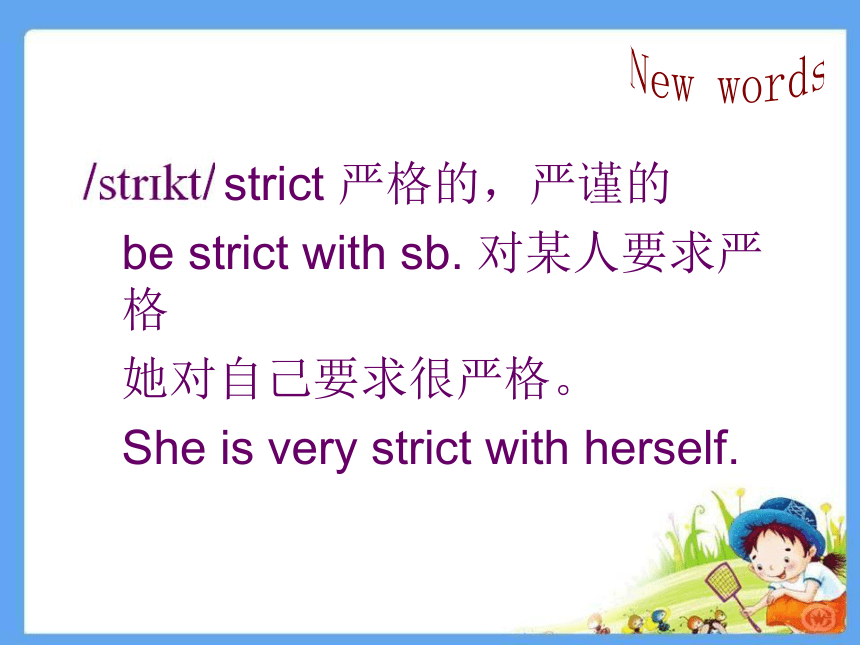
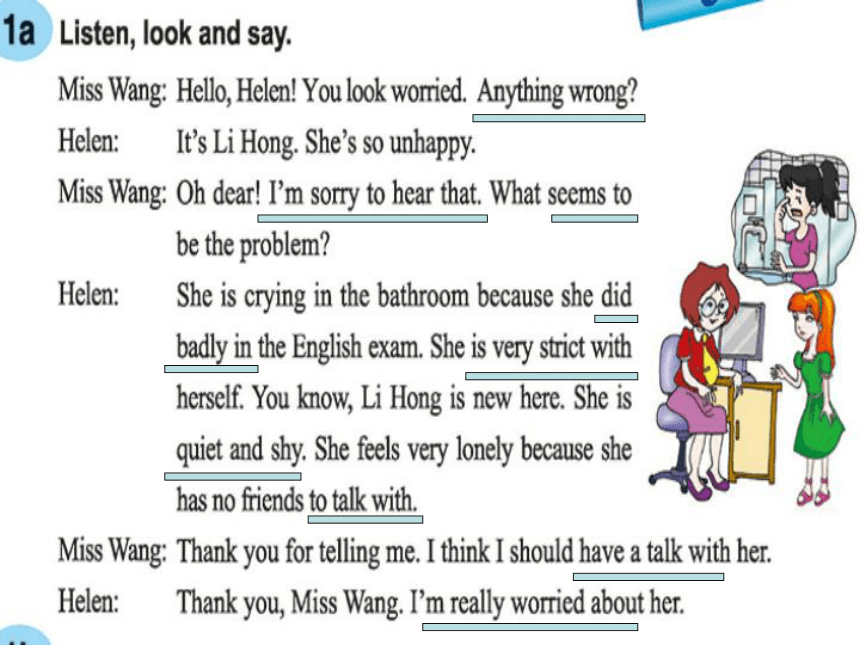
文档简介
课件85张PPT。Unit 5 Feeling Excited
Topic 2 I’m feeling better now. Section A形成,产生
对……感兴趣
觉得寂寞
使某人振作
邀请某人做某事
电影的角色
充满
一个活泼的女孩
最后,终于Word competitioncome into beingbe interested infeel lonelycheer sb. upinvite sb. to do sth. the roles of the moviebe full ofa lively girlin the end / at last天气热牛奶容易变坏。(go)
在阅览室请保持安静。(keep)
Ann似乎生病了。她(的声音)听起来糟透了。(seem, sound)
TranslationMilk goes bad easily in hot weather. Please keep quiet in the reading room. Ann seems to be ill. She sounds terrible. Look at the pictures and write down the feelings of those persons. Make conversations to tell why they have these feelings.Miss WangHelenLi Hong?exam考试They are taking/having an exam.
考试考砸了/考得好do badly/well in the exam
New wordsshy害羞She is a little shy and her face turns red. New words strict 严格的,严谨的
be strict with sb. 对某人要求严格
她对自己要求很严格。
She is very strict with herself. New words1 此句为省略句,完整的句子是:
Is there anything wrong?
e.g. Is there anything wrong with your head?
你的头有什么毛病吗?
2 I’m sorry to hear that.
听到这我感到很难过。
be sorry to do sth.
很抱歉做某事
e.g. I’m very sorry to keep you waiting so long.
很抱歉让你等这么久。3 badly为副词,修饰动词的副词通常放在被修饰的动词之后。如:listen carefully, read quickly等。do badly in 在……方面做得不好,与do well in意思相反。
e.g. Why do you think you did so badly in your text?
你认为为什么你考得这么差?
He did very well in English when he was young.
他小时候就很擅长英语。4 be strict with
对……要求严格,后面接人作宾语。
e.g. The teacher is strict with us.
老师对我们要求很严格。
be strict about/in sth.
在……方面要求严格
e.g. His father is strict with him about/in study.
他的父亲在学习方面对他要求很严格。5 She feels very lonely because she has no friends to talk with.
他感到很寂寞,因为没有朋友可以聊天。
不定式短语to talk with作后置定语修饰friends。
e.g. Mary, I can’t go there with you, because I have a lot of homework to do.
玛丽,我不能和你去那儿,因为我有许多家庭作业要做。6 have a talk with sb.
和某人交谈,talk在这里是名词,这个短语相当于talk with sb.。
e.g. You should have a talk with your son to know what he is thinking about.=
You should talk with your son to know what he is thinking about.
你应该和你儿子谈一谈,弄清楚他在想什么。
类似词组有:
have a walk
散散步;have a look
看一看。ReadMiss Wang: Hello, Helen! You look worried. Anything wrong? Helen: It’s Li Hong. She’s so unhappy. Miss Wang: Oh, dear! I’m sorry to hear that. What seems to be the problem? Helen: She is crying in the bathroom because she did badly in the English exam. She is very strict with herself. You know, Li Hong is new here. She is quiet and shy. She feels very lonely because she has no friends to talk with. Miss Wang: Thank you for telling me. I think I should have a talk with her. Helen: Thank you, Miss Wang. I’m really worried about her. Ask and answer questions in pairs based on 1a and 1b. Example:
A: Why does Helen look worried?
B: Because Li Hong is so unhappy.
… be + adj. + prep. 大搜索(不)擅长于
对……有益/害
为……担心
对某人要求严格
对……很高兴
对……害怕
为……难过
对……感兴趣
对某人很生气
喜欢
在……中爱欢迎good/bad at
good/bad for
worried about
strict with
pleased with
afraid of
sorry for
interested in
angry with
fond of
popular with7 send sth.to sb.=send sb.sth.
把某物寄给某人,类似的用法还有
:give sth.to sb.=give sb. sth.
把某物给某人;
pass sth. to sb.=pass sb. sth.
把某物传给某人。
e.g. He will send a postcard to his mother on Mother’s Day.=
He will send his mother a post-card on Mother’s Day.
他要在母亲节那天寄给妈妈一张贺卡。 Could you give me that pen?=
Could you give that pen to me?
你能把那支钢笔给我吗?
He passed the camera to her, so she could take a photo.=He passed her the camera so she could take a photo.
他把相机递给她,好让她照相。
send sb./sth. to do sth. 送某人/物做某事
e.g. I’ll send some workers to help you.
我叫几个工人去帮助你。8 need 需要,在此作实义动词,也可以作情态动词。need作实义动词时,同其他实义动词一样,有人称和时态的变化,其疑问和否定形式都要借助于助动词do/does/did。
e.g. Do you need any help?
你需要帮忙吗?
I don’t need your help, thank you.
谢谢,我不需要你来帮助。need在疑问句和否定句中可以作情态动词并且没有数和人称形式变化,后面接动词原形,其否定形式为
need not/need’t。e.g. He need not take the exam.
他不必参加考试。9 take it easy.
别紧张,别着急。
e.g.Take it easy. You can do it very well.
别着急,你会做得很棒的。
10 try to do sth.
尽力做某事e.g. Try to stay calm.
努力保持冷静。
1)try not to do sth. 尽量不做某事
e.g. You should try not to be alone.
你应该尽量不要单独一个人。2)try doing sth.
尝试做某事
e.g. You should try doing it like others.
你应该和其他人一样尝试去做。
Key points in 3worry about = be worried about
Take it easy. (安慰的话)别紧张。e.g.
- I’m afraid to give a talk in front of the class.
- Take it easy! I believe you can do it well.
1. 我们老师对我们要求严格, 这对我们有好处。(be strict with, be good for)
2.她觉得很孤独寂寞是因为她太文静腼腆,又没什么朋友。(shy) Our teachers are very strict with us. It’s good for us. She feels lonely because she is very quiet and shy, and she has few friends.3. - 我很担心明天的数学考试。(be worried)
- 别紧张!你会考得好的。
4. 到底是怎么回事?(seem to be)
5. 当你觉得心情不好时,你可以找老师谈谈。(have a talk with)
I’m worried about the math exam tomorrow.
Take it easy! You can do well in it. What seems to be the problem?When you don’t feel well, you can have a talk with your teachers. ( )1. My father is a teacher. He is always strict ____ his students.
A. to B. with C. on D. in
( )2. The weather in Beijing is not ____ good ____ that in Hainan.
A. as; than B. so; as C. than; as D. as; so
( )3. —Tomorrow we’ll have an English exam. I’m worried about it.
—____ You will do better.
A. Cheer up. B. Hurry up. C. By the way. D. Take it easy.BBDSection BUnit 5 Feeling Excited
Topic 2 I’m feeling better now. Competition:Make sentences with the phrases. good/bad at
good/bad for
worry about
strict with
pleased with
afraid of
sorry for
interested in
angry with
fond of
popular withBecause he did badly in the exam.
= He failed the exam.fail 失败The mother is very ______with her son.The boy feels very____.angrysadWhy?考砸了!How does she feel?She is very frightened. Why is she frightened?Because she is afraid of the mouse. But the cat feels happy when he sees the mouse.feeling n. 感觉,感触;想法Happy, frightened, sad, angry, and so on, are all words about feelings. 1 fail the exam= not pass the exam
考试不及格,
fail不及格,未通过。
e.g. What will you do if you fail?
如果你考试失败打算干什么?
fail to do sth.
失败、未能(做到)某事
e.g. Doctors failed to save the girl’s life.
医生们未能保住那女孩的命。2 at one’s age
在某人的年龄时
e.g. Your father began to work at your age.
你父亲在你这个年龄就开始工作了。
at the age of...
在……岁时
e.g. At the age of seven, he could swim.
在7岁时,他就会游泳。
3 make sb. do sth.
让某人做某事
laugh是宾语me的补足语。make后面的宾语补足语可以是不带to的不定式、名词、形容词、副词等。e.g. We made him monitor.
我们选他当班长。
4 I’m sure...
我相信……。sure为形容词,意为“确信的, 有把握的”。
1)be sure + that从句
e.g. I’m sure (that) he is right.
我确信他是对的。2)be sure of +名词,
意为“对……有把握”。
e.g. You are sure of a welcome at my house.
无论你什么时候到我家来都会受到欢迎。
3)be sure to do sth.
一定会做……
e.g. You are sure to win the game.
你们一定会赢得这场比赛。
5 There, there!
好啦,好啦!there在这里是语气词,表示安慰别人。
Find out and learn the key points.fail the exam: 不及格
fail to do sth. 未能做到。如:
He failed to get to the top of the mountain.
someone: somebody 某人
at one’s age: 在某人这样的年龄时,如:
Your father began to work at your age.
tell sb. jokes 给某人讲笑话
开某人玩笑: play a joke/ trick on sb.
There, there. 好啦,好啦!there在这为语气词,表示安慰别人。Helen: Hi, Li Hong! Are you OK today? Li Hong: Oh, yes. After talking with Miss Wang, I’m feeling ________ now. Helen: I’m ______ to hear that. By the way, Miss Wang says that you want to be friends with me. Li Hong: Yes. Would you like to become my friend, Helen? Helen: I’d love to. If you have any ________ with your studies, just let me know. Li Hong: Yeah, I find it ________ to learn English well. Helen: Don’t _______. I’ll help you with it. Li Hong: Thank you. You’re so ______ to me. bettergladproblemsdifficultworrykindRead the conversation and fill in the blanks. Suppose Tom is new in your class and feels lonely. Talk with him and try to help him. The following phrases may help you. Read the following pairs of words and pay attention to the sounds of the underlined letters. hear – hair fear – fair
dear – dare really – rarelyExercise- I’m worried about my son.
- ____ ____ ____ (别紧张). Children ___ ___ ____ (在他这个年龄) like to have their own ideas. ____ ___ ___ (顺便提一下 ), don’t _____ so _____ _____ him(对他这么严格).
- I ________ (失败) the driving test yesterday.
- Oh, I’m sorry to hear that. But ____ _____ _____ (这没什么).
- I have some ________ (麻烦)with my English. Could you help me?
- No problem!
- Why is Lucy angry?
- Because ________ (有人)played _____ (玩笑) on her just now.Take it easyat his age By the way be strict withfailed it doesn’t matterproblemssomeonejokes( )4. The little girl felt upset ____ her pet dog died.
A. why B. because of C. because D. what
( )5. I am not used to the food here. He isn’t, ____.
A. too B. also C. either D. still
( )6. The soft music sounds ____. We are all listening ____.
A. beautiful; carefully B. beautifully; carefully
C. moving; careful D. happily; carefulCCASection CUnit 5 Feeling Excited
Topic 2 I’m feeling better now. Read and understand. Dear Xiao Fang, March 1st
How time flies! I miss you very much. How I wish to visit you!
A few months ago, I was new here, you know. At that time, I was really upset and lonely. What’s more, I couldn’t sleep as well as usual. I was not used to anything here. I thought the roads here were not so clean as those in our hometown. The food was not as delicious as ours, either. It also seemed that the people here were not so friendly as you. But now, everything has changed. With the help of my teachers and classmates, I’m getting used to the life here. I’m not afraid to talk with others now. My classmates all accept me. I live as happily as before.
Please give my best wishes to your parents.
Yours,
Li Hong1 How time flies! 是How quickly time flies!的简略形式。
时间过得真快!(时光飞逝!)
2 What’s more
此外,而且,是插入语,是一种独立成分,可置于分句或句子之首、之尾或之中。
e.g. What’s more, he is only a nine- year-old boy.
此外,他只是一个九岁大的男孩。
3 (1)not as/so ... as ... 不如……,和……不一样……。注意:
not as/so ... as ... 中间用形容词或副词的原级。
e.g. Li Ting isn’t as/so tall as Hu Ming.
李婷没有胡明高。(2) as usual
像平常一样,用作状语。
e.g.That day, he got up early as usual, but he missed his bus.
那天,他起得像往常一样早,可是他却未赶上公交车。
4 (1)be used to sth.
习惯,适应
get/be used to doing sth.
习惯于做……
e.g. He can’t get used to the weather here.
他不习惯这儿的天气。I am used to getting up early. 我习惯于早起。
(2)used to do sth.
过去常常做某事(现在不做了)
e.g. I used to watch TV after supper.
以前晚饭后我常看电视。
5 accept 收到,接受,同义词还有receive。 receive表示客观上收到别人给予的东西,不含收件人是否愿意接受;而accept 则强调主观上愿意接受。
e.g. Our teacher always receives many cards on Teachers’Day.
我们的老师在教师节总会收到许多卡片。
He asked her to marry him and she accepted.
他向她求婚,她接受了。
6 be afraid to do sth.
不敢做某事,可与be afraid of doing sth. 转换。
e.g. The little boy is afraid to touch the fire again.=
The little boy is afraid of touching the fire again.
那男孩再也不敢碰火了。
be afraid of (doing) sth.
害怕(做)某事(物)
e.g. The girl is afraid of dogs.
这个女孩怕狗。
I’m afraid of going out alone at night.
晚上我不敢独自外出。 How time flies! 光阴似箭!
I was not used to everything here.
我不习惯这儿的一切。
be/get used to (doing) sth. 习惯于……
Make more sentences with this structure.
3. The food was not as delicious as ours, either.
either,用于否定句中,表示“也(不)”。
4. Find out and learn the sentences with the structure “as… as….” and “not as/so… as…”
Find out and learn the key points of 1a. Find out and learn the sentences with “as… as…” and “not as/so … as…” in 1a. I couldn’t sleep as well as usual.
The roads here were not so clean as those in our hometown.
The food was not as delicious as ours.
The people here were not so friendly as you.
I live as happily as before.Complete the sentences with the words in the box.
1.My father was very _______ because my mother was ill last night.
2.The children jumped and cheered because they were _________.
3.Mike is making faces. He looks as _______ as Zhao Benshan.
4.With our help, the people in Wenchuan will live as ________ as before.
5.Kangkang can’t speak English as _______ as Michael. funny happily excited well upset upsetexcitedfunnyhappilywellLook at the table and make sentences with as... as ... or not as/so… as… Then talk with your partner about the people around you. e.g.Helen is as lovely as Maria. And …. But … NamePicturelovelybravehelpfulcarefullyfastMake a similar table to compare one of your friends with you. Then write a passage. You may begin like this:
Qiqi and I are good friends. We both study at Beijing International School. Qiqi is as lovely as I, but I am not as brave as Qiqi…Summary ①We learn
1. New words and phrases:
usual, be/get used to (doing) sth., as ... as…, not as / so … as…, either, accept, lovely, helpful
2. Equal comparison(同级比较):
I live as happily as before.
I couldn’t sleep so/as well as usual.
Helen is as lovely as Maria.
Maria is not as/so brave as Helen.Complete the sentences.1. 时光飞逝! ______ _____ _____!
2. 我多么想去北京旅游啊!
_____ _____ _____ to go on a trip to Beijing!
我觉得不舒服因为我对这儿的一切都不习惯。
I don’t _____ _____ because I can’t _____ _____ ______ everything here.
4. My grandpa got up early and took a walk in the park ______ ______(和往常一样) this morning.
How time flies!feel wellget usedHow I wishtoas usualComplete the sentences.5. Alice对我很生气。我向她道歉了,但她似乎不接受。
Alice was very _____ _____ me. I ____ ____ ____ her, but it ______ ______ she didn’t _______ it.
6. Mike 字写得不如他哥哥好。而且他学习也不如他弟弟认真。
Mike doesn’t write _____ _____ _____ his elder brother. ______ _____, he doesn’t study ______ _______ _____ his younger brother, _______.
7. Helen is _____ ______ ______ (一样乐于助人的) Maria. They are both _________(可爱的)girls. angry withsaid sorry toseemed thatacceptas/so well asWhat’s moreas /so carefully aseitheras helpful as lovely( )7. ____ do you usually deal ____ your old clothes?
A. What; with B. How; with C. What; for D. How; for
( )8. My ____ brother is three years ____ than I.
A. elder; elder B. older; older C. elder; older D. older; elder
( )9. When we are in need, she never refuses ____ us.
A. to help B. helping C. help D. helps
( )10. ____ Mr. Zhang gave us some good suggestions, we still didn’t deal with those problems
very well.
A. Though B. But C. Because D. /BCAASection DUnit 5 Feeling Excited
Topic 2 I’m feeling better now. 参加考试
对某人要求严格
给某人讲笑话
别紧张
顺便提一下
像往常一样
接受Word competitiontake / have an exam
be strict with sb.
tell sb. jokes
take it easy
by the way
as usual
accept
在你这个年龄
难过的心情
英语考试考砸了
做某事有困难
像赵本山一样滑稽
和……一样可爱
像以前一样快乐生活at your age
sad feelings
fail the English exam
have problems with sth.
as funny as Zhao Benshan
as lovely as…
live as happily as beforeWord competitionSentence competition She is crying in the bathroom because she did badly in the English exam. Adverbial Clauses of Reason I’m feeling really sad because I failed the English exam. She feels very lonely because she has no friends to talk with.她在浴室里哭是因为她英语考得很差。她觉得很孤独是因为她没有可交谈的朋友。我觉得实在很难过是因为我英语考试不及格。Sentence competition l live as happily as before. Equal Comparison The food was not as delicious as ours. 我像以前一样生活得很快乐。奇奇和我一样可爱。这儿的人似乎也不如你友好。 Qiqi is as lovely as I. It also seemed that the people here were not so friendly as you. 食物不如我们的好吃。Sentence competitionI was really upset and lonely. I think I should have a talk with her. What seems to be the problem?Would you like to become my friend?How are you feeling today?Why don’t you talk to someone when you feel sad?到底是怎么回事?你今天感觉怎么样?我感觉又难过又寂寞。你要做我的朋友吗?我想我应该和她谈谈。你觉得难过的时候为什么不跟别人说呢?useless
deal with
elder
refuse
understandnot useful
to know what someone or something means
to say you will not do something
older than someone
to solve a problemSkim the passage and match the words or phrases with their meanings.1aWord formationsad + ness
un + fair
any + body
not any longer
though sadnessunfairanybody= no longer= even thoughFind out and learn the key points in the passage.
deal with sadness
for example
elder brother
refuse to do sth.
even though
no longer
it’s normal to …
it was useless to …
1 deal with
处理,解决,对付,后接名词。
e.g. Who will help you to deal with the problem?
谁愿帮你解决这个问题呢?
同义短语:do with处置,处理(可换用)
e.g.What did you do with the old books?
你怎么处理那些旧书?
2 go mad
发疯,go在此是连系动词,后多跟形容词,意思是“变得,变为,成为,处于某种状态”。
e.g. Her hair is going grey.
她的头发在变白。3 elder, old
的比较级,意为“年龄较大的,年长的”。old 有两个比较级,即older和elder。elder 只能用在表示称谓的名词前表示长、幼关系,不可作表语。
e.g. his elder sister
他的姐姐
4 refuse to do sth.
拒绝做某事
e.g.The student refused to do as the teacher said.
这个学生拒绝按照老师说的做。5 be angry with/at sb.
生某人的气
Please don’t be angry with/at me. It wasn’t my fault.
请不要冲我发脾气,不是我的错。
be angry at/about sth.
因为某事而生气
e.g.The passengers were angry at/ about the delay.
延误使乘客气愤不已。6 even though
即使,与even if 意思相同。
e.g. I’ll help you, even though/if I don’t sleep for a night.
即使我一夜不睡觉,也要帮助你。
though还有“虽然,可是,纵然”之意,引导让步状语从句,不与but在同一个句子当中连用,与because, so用法相同。
e.g. Though it was dark outside, he still went to the factory.=It was dark outside, but he still went to the factory.
虽然外面很黑,但他还是去了工厂。7 not...any longer
不再,相当于no longer。
1) not...any longer 指时间上不再延长,多与持续性动词连用。
e.g. He didn’t live in Beijing any longer.
他不再住在北京了。
2) not...any more = no more
指程度上或做某事的次数不再增加,多与短暂性动词连用。
e.g. You will not see him any more.
你将再也见不到他了。1. usual _________(adv.) ____________(同义词)
2. sad __________(n.)
3. unfair _______ (反义词) 4. happy ______(adv. ) ___________ (n.) _________(反义词)
5. old ________ / _________ (比较级)
6. accept ____________ (反义词)
7. help _________(adj.) 8. love ________ (adj.)usuallynormalsadnessfairunhappyhappilyolderelderrefusehelpfullovely词汇练习happiness9. useless_________(反义词)
10. feel __________(n.)
11. someone _________(否定式)
12. no longer ________________(同义词)
13. __________(处理) 14. __________(向……学习)
15. __________(姐姐) 16. __________(不再)usefulfeelinganyonenot… any longer词汇练习deal withlearn … fromelder sisterno longerJane and Helen are both 1.61 meters tall. (同义句)
Tom is 12 years old. Jack is 13 years old. (合并为一句)
3. He doesn’t work in this factory any longer. (同义句)句型Jane is as tall as Helen. Tom is not as old as Jack.= Jack is elder than Tom.He no longer works in this factory. 4. I worked very late last night. I feel tired. (合并为一句)
5. He is only an 8-year-old boy. He knows a lot about computer. (合并为一句)
句型I feel tired because I worked very late last night. He knows a lot about computer even though he is only an 8-year-old boy.The end.
Thanks!
Topic 2 I’m feeling better now. Section A形成,产生
对……感兴趣
觉得寂寞
使某人振作
邀请某人做某事
电影的角色
充满
一个活泼的女孩
最后,终于Word competitioncome into beingbe interested infeel lonelycheer sb. upinvite sb. to do sth. the roles of the moviebe full ofa lively girlin the end / at last天气热牛奶容易变坏。(go)
在阅览室请保持安静。(keep)
Ann似乎生病了。她(的声音)听起来糟透了。(seem, sound)
TranslationMilk goes bad easily in hot weather. Please keep quiet in the reading room. Ann seems to be ill. She sounds terrible. Look at the pictures and write down the feelings of those persons. Make conversations to tell why they have these feelings.Miss WangHelenLi Hong?exam考试They are taking/having an exam.
考试考砸了/考得好do badly/well in the exam
New wordsshy害羞She is a little shy and her face turns red. New words strict 严格的,严谨的
be strict with sb. 对某人要求严格
她对自己要求很严格。
She is very strict with herself. New words1 此句为省略句,完整的句子是:
Is there anything wrong?
e.g. Is there anything wrong with your head?
你的头有什么毛病吗?
2 I’m sorry to hear that.
听到这我感到很难过。
be sorry to do sth.
很抱歉做某事
e.g. I’m very sorry to keep you waiting so long.
很抱歉让你等这么久。3 badly为副词,修饰动词的副词通常放在被修饰的动词之后。如:listen carefully, read quickly等。do badly in 在……方面做得不好,与do well in意思相反。
e.g. Why do you think you did so badly in your text?
你认为为什么你考得这么差?
He did very well in English when he was young.
他小时候就很擅长英语。4 be strict with
对……要求严格,后面接人作宾语。
e.g. The teacher is strict with us.
老师对我们要求很严格。
be strict about/in sth.
在……方面要求严格
e.g. His father is strict with him about/in study.
他的父亲在学习方面对他要求很严格。5 She feels very lonely because she has no friends to talk with.
他感到很寂寞,因为没有朋友可以聊天。
不定式短语to talk with作后置定语修饰friends。
e.g. Mary, I can’t go there with you, because I have a lot of homework to do.
玛丽,我不能和你去那儿,因为我有许多家庭作业要做。6 have a talk with sb.
和某人交谈,talk在这里是名词,这个短语相当于talk with sb.。
e.g. You should have a talk with your son to know what he is thinking about.=
You should talk with your son to know what he is thinking about.
你应该和你儿子谈一谈,弄清楚他在想什么。
类似词组有:
have a walk
散散步;have a look
看一看。ReadMiss Wang: Hello, Helen! You look worried. Anything wrong? Helen: It’s Li Hong. She’s so unhappy. Miss Wang: Oh, dear! I’m sorry to hear that. What seems to be the problem? Helen: She is crying in the bathroom because she did badly in the English exam. She is very strict with herself. You know, Li Hong is new here. She is quiet and shy. She feels very lonely because she has no friends to talk with. Miss Wang: Thank you for telling me. I think I should have a talk with her. Helen: Thank you, Miss Wang. I’m really worried about her. Ask and answer questions in pairs based on 1a and 1b. Example:
A: Why does Helen look worried?
B: Because Li Hong is so unhappy.
… be + adj. + prep. 大搜索(不)擅长于
对……有益/害
为……担心
对某人要求严格
对……很高兴
对……害怕
为……难过
对……感兴趣
对某人很生气
喜欢
在……中爱欢迎good/bad at
good/bad for
worried about
strict with
pleased with
afraid of
sorry for
interested in
angry with
fond of
popular with7 send sth.to sb.=send sb.sth.
把某物寄给某人,类似的用法还有
:give sth.to sb.=give sb. sth.
把某物给某人;
pass sth. to sb.=pass sb. sth.
把某物传给某人。
e.g. He will send a postcard to his mother on Mother’s Day.=
He will send his mother a post-card on Mother’s Day.
他要在母亲节那天寄给妈妈一张贺卡。 Could you give me that pen?=
Could you give that pen to me?
你能把那支钢笔给我吗?
He passed the camera to her, so she could take a photo.=He passed her the camera so she could take a photo.
他把相机递给她,好让她照相。
send sb./sth. to do sth. 送某人/物做某事
e.g. I’ll send some workers to help you.
我叫几个工人去帮助你。8 need 需要,在此作实义动词,也可以作情态动词。need作实义动词时,同其他实义动词一样,有人称和时态的变化,其疑问和否定形式都要借助于助动词do/does/did。
e.g. Do you need any help?
你需要帮忙吗?
I don’t need your help, thank you.
谢谢,我不需要你来帮助。need在疑问句和否定句中可以作情态动词并且没有数和人称形式变化,后面接动词原形,其否定形式为
need not/need’t。e.g. He need not take the exam.
他不必参加考试。9 take it easy.
别紧张,别着急。
e.g.Take it easy. You can do it very well.
别着急,你会做得很棒的。
10 try to do sth.
尽力做某事e.g. Try to stay calm.
努力保持冷静。
1)try not to do sth. 尽量不做某事
e.g. You should try not to be alone.
你应该尽量不要单独一个人。2)try doing sth.
尝试做某事
e.g. You should try doing it like others.
你应该和其他人一样尝试去做。
Key points in 3worry about = be worried about
Take it easy. (安慰的话)别紧张。e.g.
- I’m afraid to give a talk in front of the class.
- Take it easy! I believe you can do it well.
1. 我们老师对我们要求严格, 这对我们有好处。(be strict with, be good for)
2.她觉得很孤独寂寞是因为她太文静腼腆,又没什么朋友。(shy) Our teachers are very strict with us. It’s good for us. She feels lonely because she is very quiet and shy, and she has few friends.3. - 我很担心明天的数学考试。(be worried)
- 别紧张!你会考得好的。
4. 到底是怎么回事?(seem to be)
5. 当你觉得心情不好时,你可以找老师谈谈。(have a talk with)
I’m worried about the math exam tomorrow.
Take it easy! You can do well in it. What seems to be the problem?When you don’t feel well, you can have a talk with your teachers. ( )1. My father is a teacher. He is always strict ____ his students.
A. to B. with C. on D. in
( )2. The weather in Beijing is not ____ good ____ that in Hainan.
A. as; than B. so; as C. than; as D. as; so
( )3. —Tomorrow we’ll have an English exam. I’m worried about it.
—____ You will do better.
A. Cheer up. B. Hurry up. C. By the way. D. Take it easy.BBDSection BUnit 5 Feeling Excited
Topic 2 I’m feeling better now. Competition:Make sentences with the phrases. good/bad at
good/bad for
worry about
strict with
pleased with
afraid of
sorry for
interested in
angry with
fond of
popular withBecause he did badly in the exam.
= He failed the exam.fail 失败The mother is very ______with her son.The boy feels very____.angrysadWhy?考砸了!How does she feel?She is very frightened. Why is she frightened?Because she is afraid of the mouse. But the cat feels happy when he sees the mouse.feeling n. 感觉,感触;想法Happy, frightened, sad, angry, and so on, are all words about feelings. 1 fail the exam= not pass the exam
考试不及格,
fail不及格,未通过。
e.g. What will you do if you fail?
如果你考试失败打算干什么?
fail to do sth.
失败、未能(做到)某事
e.g. Doctors failed to save the girl’s life.
医生们未能保住那女孩的命。2 at one’s age
在某人的年龄时
e.g. Your father began to work at your age.
你父亲在你这个年龄就开始工作了。
at the age of...
在……岁时
e.g. At the age of seven, he could swim.
在7岁时,他就会游泳。
3 make sb. do sth.
让某人做某事
laugh是宾语me的补足语。make后面的宾语补足语可以是不带to的不定式、名词、形容词、副词等。e.g. We made him monitor.
我们选他当班长。
4 I’m sure...
我相信……。sure为形容词,意为“确信的, 有把握的”。
1)be sure + that从句
e.g. I’m sure (that) he is right.
我确信他是对的。2)be sure of +名词,
意为“对……有把握”。
e.g. You are sure of a welcome at my house.
无论你什么时候到我家来都会受到欢迎。
3)be sure to do sth.
一定会做……
e.g. You are sure to win the game.
你们一定会赢得这场比赛。
5 There, there!
好啦,好啦!there在这里是语气词,表示安慰别人。
Find out and learn the key points.fail the exam: 不及格
fail to do sth. 未能做到。如:
He failed to get to the top of the mountain.
someone: somebody 某人
at one’s age: 在某人这样的年龄时,如:
Your father began to work at your age.
tell sb. jokes 给某人讲笑话
开某人玩笑: play a joke/ trick on sb.
There, there. 好啦,好啦!there在这为语气词,表示安慰别人。Helen: Hi, Li Hong! Are you OK today? Li Hong: Oh, yes. After talking with Miss Wang, I’m feeling ________ now. Helen: I’m ______ to hear that. By the way, Miss Wang says that you want to be friends with me. Li Hong: Yes. Would you like to become my friend, Helen? Helen: I’d love to. If you have any ________ with your studies, just let me know. Li Hong: Yeah, I find it ________ to learn English well. Helen: Don’t _______. I’ll help you with it. Li Hong: Thank you. You’re so ______ to me. bettergladproblemsdifficultworrykindRead the conversation and fill in the blanks. Suppose Tom is new in your class and feels lonely. Talk with him and try to help him. The following phrases may help you. Read the following pairs of words and pay attention to the sounds of the underlined letters. hear – hair fear – fair
dear – dare really – rarelyExercise- I’m worried about my son.
- ____ ____ ____ (别紧张). Children ___ ___ ____ (在他这个年龄) like to have their own ideas. ____ ___ ___ (顺便提一下 ), don’t _____ so _____ _____ him(对他这么严格).
- I ________ (失败) the driving test yesterday.
- Oh, I’m sorry to hear that. But ____ _____ _____ (这没什么).
- I have some ________ (麻烦)with my English. Could you help me?
- No problem!
- Why is Lucy angry?
- Because ________ (有人)played _____ (玩笑) on her just now.Take it easyat his age By the way be strict withfailed it doesn’t matterproblemssomeonejokes( )4. The little girl felt upset ____ her pet dog died.
A. why B. because of C. because D. what
( )5. I am not used to the food here. He isn’t, ____.
A. too B. also C. either D. still
( )6. The soft music sounds ____. We are all listening ____.
A. beautiful; carefully B. beautifully; carefully
C. moving; careful D. happily; carefulCCASection CUnit 5 Feeling Excited
Topic 2 I’m feeling better now. Read and understand. Dear Xiao Fang, March 1st
How time flies! I miss you very much. How I wish to visit you!
A few months ago, I was new here, you know. At that time, I was really upset and lonely. What’s more, I couldn’t sleep as well as usual. I was not used to anything here. I thought the roads here were not so clean as those in our hometown. The food was not as delicious as ours, either. It also seemed that the people here were not so friendly as you. But now, everything has changed. With the help of my teachers and classmates, I’m getting used to the life here. I’m not afraid to talk with others now. My classmates all accept me. I live as happily as before.
Please give my best wishes to your parents.
Yours,
Li Hong1 How time flies! 是How quickly time flies!的简略形式。
时间过得真快!(时光飞逝!)
2 What’s more
此外,而且,是插入语,是一种独立成分,可置于分句或句子之首、之尾或之中。
e.g. What’s more, he is only a nine- year-old boy.
此外,他只是一个九岁大的男孩。
3 (1)not as/so ... as ... 不如……,和……不一样……。注意:
not as/so ... as ... 中间用形容词或副词的原级。
e.g. Li Ting isn’t as/so tall as Hu Ming.
李婷没有胡明高。(2) as usual
像平常一样,用作状语。
e.g.That day, he got up early as usual, but he missed his bus.
那天,他起得像往常一样早,可是他却未赶上公交车。
4 (1)be used to sth.
习惯,适应
get/be used to doing sth.
习惯于做……
e.g. He can’t get used to the weather here.
他不习惯这儿的天气。I am used to getting up early. 我习惯于早起。
(2)used to do sth.
过去常常做某事(现在不做了)
e.g. I used to watch TV after supper.
以前晚饭后我常看电视。
5 accept 收到,接受,同义词还有receive。 receive表示客观上收到别人给予的东西,不含收件人是否愿意接受;而accept 则强调主观上愿意接受。
e.g. Our teacher always receives many cards on Teachers’Day.
我们的老师在教师节总会收到许多卡片。
He asked her to marry him and she accepted.
他向她求婚,她接受了。
6 be afraid to do sth.
不敢做某事,可与be afraid of doing sth. 转换。
e.g. The little boy is afraid to touch the fire again.=
The little boy is afraid of touching the fire again.
那男孩再也不敢碰火了。
be afraid of (doing) sth.
害怕(做)某事(物)
e.g. The girl is afraid of dogs.
这个女孩怕狗。
I’m afraid of going out alone at night.
晚上我不敢独自外出。 How time flies! 光阴似箭!
I was not used to everything here.
我不习惯这儿的一切。
be/get used to (doing) sth. 习惯于……
Make more sentences with this structure.
3. The food was not as delicious as ours, either.
either,用于否定句中,表示“也(不)”。
4. Find out and learn the sentences with the structure “as… as….” and “not as/so… as…”
Find out and learn the key points of 1a. Find out and learn the sentences with “as… as…” and “not as/so … as…” in 1a. I couldn’t sleep as well as usual.
The roads here were not so clean as those in our hometown.
The food was not as delicious as ours.
The people here were not so friendly as you.
I live as happily as before.Complete the sentences with the words in the box.
1.My father was very _______ because my mother was ill last night.
2.The children jumped and cheered because they were _________.
3.Mike is making faces. He looks as _______ as Zhao Benshan.
4.With our help, the people in Wenchuan will live as ________ as before.
5.Kangkang can’t speak English as _______ as Michael. funny happily excited well upset upsetexcitedfunnyhappilywellLook at the table and make sentences with as... as ... or not as/so… as… Then talk with your partner about the people around you. e.g.Helen is as lovely as Maria. And …. But … NamePicturelovelybravehelpfulcarefullyfastMake a similar table to compare one of your friends with you. Then write a passage. You may begin like this:
Qiqi and I are good friends. We both study at Beijing International School. Qiqi is as lovely as I, but I am not as brave as Qiqi…Summary ①We learn
1. New words and phrases:
usual, be/get used to (doing) sth., as ... as…, not as / so … as…, either, accept, lovely, helpful
2. Equal comparison(同级比较):
I live as happily as before.
I couldn’t sleep so/as well as usual.
Helen is as lovely as Maria.
Maria is not as/so brave as Helen.Complete the sentences.1. 时光飞逝! ______ _____ _____!
2. 我多么想去北京旅游啊!
_____ _____ _____ to go on a trip to Beijing!
我觉得不舒服因为我对这儿的一切都不习惯。
I don’t _____ _____ because I can’t _____ _____ ______ everything here.
4. My grandpa got up early and took a walk in the park ______ ______(和往常一样) this morning.
How time flies!feel wellget usedHow I wishtoas usualComplete the sentences.5. Alice对我很生气。我向她道歉了,但她似乎不接受。
Alice was very _____ _____ me. I ____ ____ ____ her, but it ______ ______ she didn’t _______ it.
6. Mike 字写得不如他哥哥好。而且他学习也不如他弟弟认真。
Mike doesn’t write _____ _____ _____ his elder brother. ______ _____, he doesn’t study ______ _______ _____ his younger brother, _______.
7. Helen is _____ ______ ______ (一样乐于助人的) Maria. They are both _________(可爱的)girls. angry withsaid sorry toseemed thatacceptas/so well asWhat’s moreas /so carefully aseitheras helpful as lovely( )7. ____ do you usually deal ____ your old clothes?
A. What; with B. How; with C. What; for D. How; for
( )8. My ____ brother is three years ____ than I.
A. elder; elder B. older; older C. elder; older D. older; elder
( )9. When we are in need, she never refuses ____ us.
A. to help B. helping C. help D. helps
( )10. ____ Mr. Zhang gave us some good suggestions, we still didn’t deal with those problems
very well.
A. Though B. But C. Because D. /BCAASection DUnit 5 Feeling Excited
Topic 2 I’m feeling better now. 参加考试
对某人要求严格
给某人讲笑话
别紧张
顺便提一下
像往常一样
接受Word competitiontake / have an exam
be strict with sb.
tell sb. jokes
take it easy
by the way
as usual
accept
在你这个年龄
难过的心情
英语考试考砸了
做某事有困难
像赵本山一样滑稽
和……一样可爱
像以前一样快乐生活at your age
sad feelings
fail the English exam
have problems with sth.
as funny as Zhao Benshan
as lovely as…
live as happily as beforeWord competitionSentence competition She is crying in the bathroom because she did badly in the English exam. Adverbial Clauses of Reason I’m feeling really sad because I failed the English exam. She feels very lonely because she has no friends to talk with.她在浴室里哭是因为她英语考得很差。她觉得很孤独是因为她没有可交谈的朋友。我觉得实在很难过是因为我英语考试不及格。Sentence competition l live as happily as before. Equal Comparison The food was not as delicious as ours. 我像以前一样生活得很快乐。奇奇和我一样可爱。这儿的人似乎也不如你友好。 Qiqi is as lovely as I. It also seemed that the people here were not so friendly as you. 食物不如我们的好吃。Sentence competitionI was really upset and lonely. I think I should have a talk with her. What seems to be the problem?Would you like to become my friend?How are you feeling today?Why don’t you talk to someone when you feel sad?到底是怎么回事?你今天感觉怎么样?我感觉又难过又寂寞。你要做我的朋友吗?我想我应该和她谈谈。你觉得难过的时候为什么不跟别人说呢?useless
deal with
elder
refuse
understandnot useful
to know what someone or something means
to say you will not do something
older than someone
to solve a problemSkim the passage and match the words or phrases with their meanings.1aWord formationsad + ness
un + fair
any + body
not any longer
though sadnessunfairanybody= no longer= even thoughFind out and learn the key points in the passage.
deal with sadness
for example
elder brother
refuse to do sth.
even though
no longer
it’s normal to …
it was useless to …
1 deal with
处理,解决,对付,后接名词。
e.g. Who will help you to deal with the problem?
谁愿帮你解决这个问题呢?
同义短语:do with处置,处理(可换用)
e.g.What did you do with the old books?
你怎么处理那些旧书?
2 go mad
发疯,go在此是连系动词,后多跟形容词,意思是“变得,变为,成为,处于某种状态”。
e.g. Her hair is going grey.
她的头发在变白。3 elder, old
的比较级,意为“年龄较大的,年长的”。old 有两个比较级,即older和elder。elder 只能用在表示称谓的名词前表示长、幼关系,不可作表语。
e.g. his elder sister
他的姐姐
4 refuse to do sth.
拒绝做某事
e.g.The student refused to do as the teacher said.
这个学生拒绝按照老师说的做。5 be angry with/at sb.
生某人的气
Please don’t be angry with/at me. It wasn’t my fault.
请不要冲我发脾气,不是我的错。
be angry at/about sth.
因为某事而生气
e.g.The passengers were angry at/ about the delay.
延误使乘客气愤不已。6 even though
即使,与even if 意思相同。
e.g. I’ll help you, even though/if I don’t sleep for a night.
即使我一夜不睡觉,也要帮助你。
though还有“虽然,可是,纵然”之意,引导让步状语从句,不与but在同一个句子当中连用,与because, so用法相同。
e.g. Though it was dark outside, he still went to the factory.=It was dark outside, but he still went to the factory.
虽然外面很黑,但他还是去了工厂。7 not...any longer
不再,相当于no longer。
1) not...any longer 指时间上不再延长,多与持续性动词连用。
e.g. He didn’t live in Beijing any longer.
他不再住在北京了。
2) not...any more = no more
指程度上或做某事的次数不再增加,多与短暂性动词连用。
e.g. You will not see him any more.
你将再也见不到他了。1. usual _________(adv.) ____________(同义词)
2. sad __________(n.)
3. unfair _______ (反义词) 4. happy ______(adv. ) ___________ (n.) _________(反义词)
5. old ________ / _________ (比较级)
6. accept ____________ (反义词)
7. help _________(adj.) 8. love ________ (adj.)usuallynormalsadnessfairunhappyhappilyolderelderrefusehelpfullovely词汇练习happiness9. useless_________(反义词)
10. feel __________(n.)
11. someone _________(否定式)
12. no longer ________________(同义词)
13. __________(处理) 14. __________(向……学习)
15. __________(姐姐) 16. __________(不再)usefulfeelinganyonenot… any longer词汇练习deal withlearn … fromelder sisterno longerJane and Helen are both 1.61 meters tall. (同义句)
Tom is 12 years old. Jack is 13 years old. (合并为一句)
3. He doesn’t work in this factory any longer. (同义句)句型Jane is as tall as Helen. Tom is not as old as Jack.= Jack is elder than Tom.He no longer works in this factory. 4. I worked very late last night. I feel tired. (合并为一句)
5. He is only an 8-year-old boy. He knows a lot about computer. (合并为一句)
句型I feel tired because I worked very late last night. He knows a lot about computer even though he is only an 8-year-old boy.The end.
Thanks!
同课章节目录
- Unit 5 Feeling excited
- Topic 1 You look excited
- Topic 2 I’m feeling better now.
- Topic 3 Many things can affect our feelings.
- Unit 6 Enjoying Cycling
- Topic 1 We're going on a three-day visit to Mount
- Topic 2 How about exploring Tian’anmen Square?
- Topic 3 Bicycle riding is good exercise.
- Unit 7 Food festival
- Topic 1 We’re preparing for a food festival.
- Topic 2 I’m not sure whether I can cook it well.
- Topic 3 I Cooked the Most Successfully
- Unit 8 Our Clothes
- Topic 1 We will have a class fashion show.
- Topic 2 We can design our own uniforms.
- Topic 3 He said the fashion show was wonderful.
